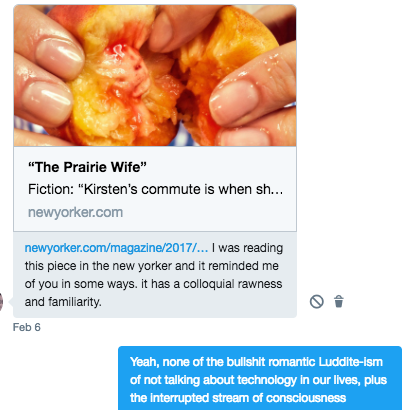My friend introduced me to Curtis Sittenfield through her story “The Prairie Wife.” He also bitched about his high school students and so, the anonymity. It’s a good read:



The Prairie Wife is an incisive commentary about gender roles, sexuality and identity; how people use others or need others to locate themselves. Plus, it has a neat twist using one of the worst tricks in the high school lit mag handbook: the withholding of information about a character. But The Prairie Wife’s strategic withholding and then inclusion of basic information isn’t as much of a twist as it is a way to prey on our conceptions of social norms. It’s brilliant.
The Prairie Wife has a subtle and very interesting angle about social media in it. At one point, the main character, Kirsten, remarks, “It seems pretty hard to be famous nowadays,” referring to the social media celebrity throughout the story.
“Kirsten hates Lucy Headrick because she’s a hypocrite,” is her first, less gracious take. Kirsten escapes her more mundane “wifely” realities by following and bitterly hating the social media presence of the Prairie Wife, Lucy, who before becoming a foodie and happy wife of an evangelical farmboy, had sex with Kirsten. And on social media, she’s usually so promotion-based that Kirsten can discern her PR team from her genuine tweets later at night, setting up the idea of a real Lucy and a fake Lucy.
Her comment about celebrity then is about the effort involved in Lucy’s staging or editing of her life into a lifestyle brand, her evangelical curses (“schnookerdoodle,” “fudge”) obnoxious phrases like, “Omigosh” and what Kirsten takes to be a false sense of nervousness. Her interactions with fans, over social media and in studio, consisting of multiple exclamation marks and Woos from a television audience, appear to be shallow.
But does the fact that Lucy really is nervous and candid on tv mean she is “still herself,” as Kirsten concludes at the end of the day-time segment? Or, more interestingly, is the narration highlighting the irony of Kirsten’s remark?
It’s Kirsten who puts in painstaking effort to check Lucy’s newsfeed on multiple social media channels and goes out of her way, despite her family and work, to watch her television appearance—and, is she secretly hoping to be identified as an ex-lover? At the very end of the story, even after she gets an affectionate gesture from Casey, Kirsten looks for a Twitter reply from Lucy, any connection to the girl who used to be excited about her, and herself then as the object of her excitement.
Is it just as exhausting to be a fan of a celebrity with social media? That’s The Prairie Wife’s implicit question.
But the accessibility of social media also yields important moments like this:

I read The Prairie Wife on my daily train into the New York City. The COMMUTER LIFE, as I styled it on Instagram. A few paragraphs in, I said to my friend, “Yeah, none of the bullshit romantic Luddite-ism of not talking about technology in our lives…” My confirmation bias was premature. The narrator introduces an anti-technology strain early on, Kirsten “reading an article about how smartphones are destroying people’s ability to concentrate […]”
“Is it worth the long read?” I was trying to choose between that and getting in an extra hour of sleep before Grand Central, so come on.
But I don’t live the COMMUTER LIFE anymore. Back to freelancing baby. *Anxiety skyrockets* It’s given me time to finally read and interact with the contemporary literary community. But where, the fuck, does one begin? Here’s my sophisticated process: I click on the free stories that show up on my Twitter feed, mosey around on the site, find one that I like and write about it.
I’m also looking for evidence for where I see literature going with the increasing influence of Web 2.0. That’s why I jumped on the anti-Luddite-ism of Sittenfield’s choice to include social media into her story. Among other things, I believe that fiction of the near future will have an increased attention to all the surfaces (in our minds, IRL, tv, online, streaming, social media, virtual reality) where our psychological interactions take place, creating a type of modularity that allows the continuation of narrative threads across all of them. And unlike Alt-Lit, I don’t it will, or should, make a preference (real, or ironic, or self-deprecatingly “honest”) for online over meatspace. Despite the attention comment, I’m logging Sittenfield’s The Prairie Wife in this category.
Image courtesy of Pinterest, Nice Illustrations. lol.
